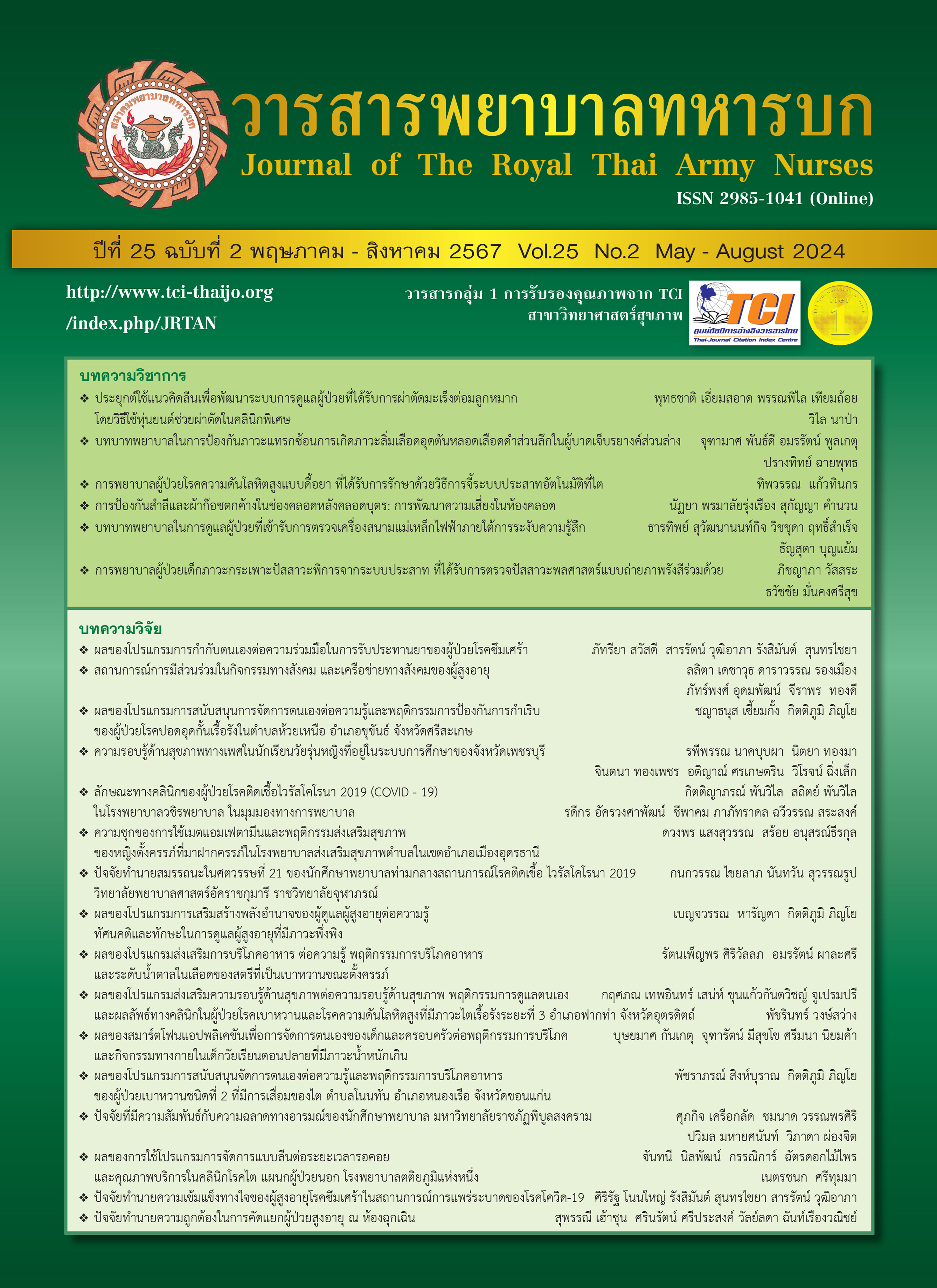Causal Factors Affecting Social and Health Protection Behaviors of Female Students in the Junior High Schools
Keywords:
protective behavior, social and health protection behaviors, female students, Junior High SchoolsAbstract
The objectives were to study social and health protection behaviors and to examine the causal factors of social and health protection behaviors of the junior high school students. Samples were 1,250 female students in the junior high schools. The research instruments were 14 questionnaires. Cronbach’s alpha coefficients were 0.77 – 0.90. Data were analyzed using frequency, percentage, mean, standard deviation, Pearson’s correlation coefficients, and path analysis.
The results found that the important causal factors were the value of self-conservation, social and health news exposure, and a positive attitude towards social protection and health. The results can be used to guide violence prevention by focusing on encouraging students’ good moral characters so that students can receive proper care and develop good behaviors for violence prevention.
Downloads
References
Kassie A, Handebo S, Adugna A, Shitu K. Violence against girls during COVID-19 pandemicand associated factors in Gondar city, Northwest Ethiopia. Epidemiology & Infection; 2022, 150(e31): 1-6.
Fawole, OI, Balogun OD, Olaleye O. Experience of gender-based violence to students in public and private secondary schools in Ilorin, Nigeria. Ghana medical journal; 2018, 52(2): 66-73.
Estevez-Casellas C, Gómez-Medina M, Sitges E. Relationship between emotional intelligence and violence exerted, received, and perceived in teen dating relationships. International journal of environmental research and public health; 2021, 18(5): 2-15.
Women Moving Forward Foundation. Revealing statistics of sexual violence in Thailand rising, Found the perpetrator minimum 5 years old. workpointTODAY, (20 October 2018); 2018. (in Thai)
Desalegne Z. Gender-based violence and its associated effects on female students: The case of Gozamin and Nigus T/Haimanot secondary schools in the east Gojjam administrative zone, Ethiopia. Journal of International Women’s Studies; 2019, 20(7): 237-46.
Pinos V, Pinos G, Jerves M, Enzlin P. Attitudes of adolescents toward violence and their related factors. Maskana; 2016, 7(2): 1-15.
Archer RJL. Sexual assault victimization, fear of sexual assault, and self – protective behaviors: A test of general strain theory. Victims & Offenders; 2019, 14(4): 387-407.
Child Sexual Abuse (CSA) Workshop. Effects of child sexual abuse: Behaviors, feelings, and Relationships; 2015
Monyarit S. Situation of sexually transmitted diseases, 5 main diseases in youth, Thailand, fiscal year 2014-2018: Analyzed according to the 5-dimensional disease surveillance system framework. Nonthaburi: Department of Disease Control, Ministry of Public Health; 2020. (in Thai)
Finkenauer C, Buyukcan-Tetik A, Baumeister RF, Schoemaker K, Bartels M, Vohs KD. Out of control: Identifying the role of self-control strength in family violence. Current Directions in Psychological Science; 2015, 24(4): 261-66.
Pinos-Vèlez V, Pinos G Jerves EM, Enzlin P. Attitudes of adolescents toward violence and their related factors. MASKANA; 2016, 7(2): 1-15.
Bhanthumnavin D. Antecedents of mindful risk-taking behavior in secondary school students: A path analytic approach. Journal of Behavioral Science; 2015, 21(1): 75-94. (in Thai)
Thongnuch S. A study of self – preservation of female adolescents at the undergraduate level (Master of Educational Psychology and Guidance Graduate Thesis) Srinakharinwirot University College, Bangkok; 2009. (in Thai)
Sukhanan P, Buripakdi C, Pongtiyapiboon S. The development of self-Preservation value and behaviour by applying systems thinking, value clarification and self - empowerment to Junior High School girls at Phetchaburi province. Journal of the Association of Researcher; 2019, 24(1): 136-50. (in Thai)
Sirisakulpaisal B, von Bormann S, Boonpleng W, Kerdsuwan P, Buapud S, Somnuekprasert, W. Relationship between knowledge, attitude, perception of self - protection skills and risk behavior to pregnancy of Junior High School students. Journal of Nursing Science; 2018, 36(4): 77-86. (in Thai)
Bhanthumnavin D. Documents for the action meeting (No. 1) subject “Research and Development of Thai Behavior Systems: Research project to support national strategy” the national research council and the committee. of national institute for research and development of the Thai Behavior System 2003. (in Thai)
de Vellis RF. Scale development theory and applications. (2nd ed.) Thousand. Oaks, CA Sage Publications; 2003.
Spector PE. Summated rating scale construction: An introduction. Newbury Park, CA Sage; 1992. 19.Riapcharoen A. Integrated causal factors between home, school, and the mind: Characteristics related to sexual harassment prevention behavior of female students in the secondary school in the stepping forward with understanding project. National Institute of Development Administration, Bangkok; 2006. (in Thai)
Teeraprateep S. Psychosocial factors related to self - preservation behavior of vocational education students. National Institution of Development Administration, Bangkok; 2006. (in Thai)
Saiphopu K. Psychosocial factors related to cleanliness behavior of Junior high school students. (Master of Development Administration Thesis). National Institution of Development Administration, Bangkok; 2003. (in Thai)
Promlakkhano D. Causal factors and consequences of smart behavior to take care of one’s health of high school students in the health promotion school project (Research report). Development Administration, Bangkok; 2006. (in Thai)
Phichitanon R. Psychosocial factors related to late teen students’ eating behavior students. (Master of Development Administration Thesis). National Institution of Development Administration, Bangkok; 2003. (in Thai)
Thamcharoen S, Suwandee L. Psychosocial indicators of ethical behavior of teenagers in areas with different levels of provocation sources. Department of Psychology, Burapha University, Chonburi; 2547. (in Thai)
Keskomon T, Thutsaringkarnsakul S. Antecedents and consequences concerning nursing instructors’ attitude and behavior in strengthening zero tlerance practices in nursing students. Journal of the Royal Thai Army Nurses; 2020, 21(3): 392- 403. (in Thai)
Downloads
Published
How to Cite
Issue
Section
License
Copyright (c) 2024 Journal of The Royal Thai Army Nurses

This work is licensed under a Creative Commons Attribution-NonCommercial-NoDerivatives 4.0 International License.
บทความหรือข้อคิดเห็นใดใดที่ปรากฏในวารสารพยาบาลทหารบกเป็นวรรณกรรมของผู้เขียน ซึ่งบรรณาธิการหรือสมาคมพยาบาลทหารบก ไม่จำเป็นต้องเห็นด้วย
บทความที่ได้รับการตีพิมพ์เป็นลิขสิทธิ์ของวารสารพยาบาลทหารบก
The ideas and opinions expressed in the Journal of The Royal Thai Army Nurses are those of the authors and not necessarily those
of the editor or Royal Thai Army Nurses Association.






